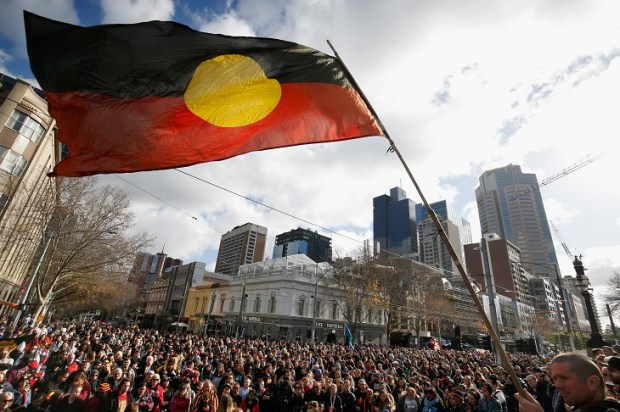Outside St. Mary’s Cathedral during Cardinal Pell’s funeral, a group of protesters heckled mourners with loud noise. The numbers vary; the ABC have suggested the protesters outnumbered the mourners, a claim debated by Lyle Shelton from the Family First Party. Regardless of numbers, the behaviour of these protesters mirror the Westboro Baptist Church, holding signs about hellfire while mothers bury their sons.
No funeral should require the police vans and security seen outside St. Mary’s Cathedral. Those savvy to Australian politics and culture aren’t surprised. So far in 2023, Christianity has suffered numerous attacks: one journalist’s reporting against Tangara and Redfield College, Josh Landis’ suggestion about Dominic Perrottet’s ‘Catholic gut’ (Landis did apologise), and vendettas in the press against Christian schools, as reflected in their opinion pages. It is heartbreaking to imagine the previous week of a Tangara communications manager, who probably dealt with absurd abuse via email and phone messages.
We have just entered February. Sectarianism is fashionable. There are those sprouting ugly and intolerant views. Churches, meanwhile, undergo vandalism. Canberra’s historical St Thomas Aquinas Church underwent severe vandalism in 2021. Two splendid sculptures, located in Churches at Albury, were beheaded weeks before Christmas. A Goulburn church has endured vandalism, too. Australia must not match the carnage dominating in France, India, and Canada, where Christian churches are burnt and vandalised, as seen in Saint-Denis basilica in early 2022, where a man broke several statues and stained glass windows. French Catholic churches have also suffered from terrorist attacks, a notable example being Nice Cathedral, where an Islamic extremist murdered multiple Catholics. This evil must not infect Australia.
It is obvious that some Australians, powerful in media, business, and politics, have a special dislike against Christianity. Other religions suffer, too: the Community Security Group, aimed at protecting the Jews people, reported many incidents in 2021 of harassment, assault, and vandalism outside synagogues. Mosques reflect this trend, too. Charles Sturt University has described ‘violence and hatred’ against Australian mosques, and has deemed it as ‘widespread’ based on a survey of 75 mosques. Other religions, whether Hinduism, Buddhism, or others, may also have their own experiences, which certainly can help us understand religious life in contemporary Australia.
The point isn’t to compare any religious experience with the other, or to equate any suffering inflicted against a group. Nor is it true to assume all vandalism and harassment comes from irreligious individuals. Rather, I wish to illustrate a reality: being religious, particularly Christian, in Australia comes with discrimination, and therefore, risk. After witnessing the wretched scenes outside Cardinal Pell’s funeral, proposed laws came to mind, certainly controversial but necessary.
To start, churches and other places of worship may require legally-enforced buffer zones. These zones would prohibit protests within its grounds. Those who commit vandalism and harassment within a Church or a religious building, will have an extra criminal charge levelled against them and have to pay for repairs, as well as a contribution towards the Church’s ongoing security. The Australian and state governments must establish a hotline to report and record these crimes, where various departments, including education, are briefed on religious discrimination within Australia. The Australian Broadcasting Corporation must also invest in coverage about religious discrimination. Temporarily, the ABC should take a pay cut to recoup the money the Australian taxpayer lost in previous legal cases, adjusted for inflation.
The average ABC worker and public servant is required to take training on diversity, inclusion, and Aboriginal affairs. This must include the input from religious leaders with direct experience in vandalism, harassment, and physical violence. It isn’t possible to annihilate sectarianism or religious discrimination. Nor should Australia seek to censor social media speech or anyone’s opinion. However, we can reduce discrimination and offer legal protections to those suffering from vandalism, harassment, and protesters disrupting funerals. We can use our taxpayer-funded institutions to support religious tolerance.
Both Sydney and Melbourne councils have no qualms about funding Pride events. It is not unreasonable, it is fair, to demand similar investments to community outreach and educational programs about the wrongs of religious discrimination.
This radical proposal comes with anguish. Australia shouldn’t need these laws; we are meant to be a liberal culture, valuing freedom of expression, protest, and religion. Our laws prohibiting trespassing, assault, defamation, and vandalism should suffice. But they don’t. The past decade has seen vile and censorious behaviour at our universities. In many states, including New South Wales, there are laws prohibiting protests outside abortion centres. An individual praying and standing outside these clinics is now subject to fines and legal action. This legislation was justified by journalists and politicians due to the belief that women were being abused and heckled within these areas. Therefore, it is not unreasonable for religious groups to enjoy the same protection while at places of worship. Of course, such a policy would require a discussion about practicality. Not all religions would require these laws or be interested in them. These concerns are worth debating, as are discussions about protecting secular conservative and right-wing groups from the depravity of activists such as Antifa.
Progressives don’t have a monopoly on using legislation for their own ends. Those among us; religious or irreligious, conservative or libertarian, young or old, should remember that. We can, and should, advocate for laws to protect us from physical assault and vandalism. It is unacceptable for our state broadcaster to pour oil on the flames of sectarianism. Victory isn’t won through ‘taking back the institutions’ or ‘debating their points.’ Whilst both are admirable and crucial, the average citizen mostly responds to hard power derived from the law.
It is time to take the righteous journey against sectarianism, religious discrimination, and bias besieging Australia. We have a moral duty to protect our countrymen and women from this hideous behaviour. No Australian deserves protests at their funeral.
Madeleine Rose Jones blogs at Snowy Fictions.
Got something to add? Join the discussion and comment below.
Get 10 issues for just $10
Subscribe to The Spectator Australia today for the next 10 magazine issues, plus full online access, for just $10.


























Comments
Don't miss out
Join the conversation with other Spectator Australia readers. Subscribe to leave a comment.
SUBSCRIBEAlready a subscriber? Log in